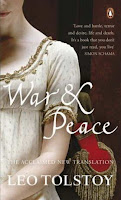Volume II: War and Peace by Leo Tolstoy
Volume II (315 - 664) of War and Peace by Leo Tolstoy (Penguin, 2005 (1392); FP: 1869) translated by Anthony Briggs concentrates less on the war with France and more with the shenanigans and trickery of the elite and those who pretend to be. There was also a lot marital unrest with, cheating, ranking highest.
In this part, Prince Andrey Bolkonsky comes home the day his wife delivers and dies. This took the Prince into a period of gloom only to fall in love with Natasha Rostov and get his heart broken after she falls in love with the careless Anatole Kuragin. Pierre (Count Bezukhov) hears stories about his cheating wife, Helene, with his friend Dolokhov and challenges him to a duel of which both survives but Dolokhov left with a bullet wound. Pierre could be said to be the most frustrated person in the novel. He is seeking the meaning of life but finds that even for those who claim they have found the way, their lives is antithetical to what they preach and unable to reconcile how this could be, Pierre reverts to his earlier life of heavy drinking and gloom. This is after he has been introduced to Freemason and found its teachings lacking in the lives of its adherents. However, Pierre who comes back to live with his wife again after the separation that resulted after the duel, cannot resolve the meaning of his feelings for Natasha and knowing that his Prince Andrey is engaged to her, he left Moscow to Petersburg.
Boris Drubetskoy and Nikolay Rostov are still in the army, finding ways to move up higher the ranks. Boris is determined, like her mother Anna Mikhaylovna, to engineer his way into elitism even if it has to be to marry into riches and this he did by marrying Julie Karagin. In the military he did everything that will see him rise including holding the Russia's enemy, Emperor Bonaparte, in high esteem. For him, not born a count or prince, he must force his way through. Boris is balanced perfectly, or somewhat, by Nikolay Rostov who is extremely patriotic and sought favour in the Tsar and Russia and is prepared to die for both for they are one and the same thing. He is much more open-minded and does not need to do anything extraordinary to be respected. But he will still do anything for his mother, Countess Rostov. However, when it comes to marriage he wants to be his own man and this means marrying Sonya, a woman with no dowry, as the countess describes her. This wouldn't have been a problem but the profligate lifestyle of Count Rostov is sending the family into ruin and unless Nikolay marries into riches the family will fall off the social status and have to live in poverty. Nikolay himself cares less about that but the countess does.
Prince Andrey falls in love with Natasha and is prepared to marry her against his father's wishes. But he wants to travel through Europe to recuperate from depression that came upon him following the death of his wife. And Natasha is flighty. Her decisions are guided by her heart and once if flutters her mind also flutters. She is very much unlike Sonya who was prepared to go through everything, including taunts from her benefactors - the Rostovs, to marry Nikolay. when Anatole promised her love, Natasha was ready to elope.
Tolstoy has a way of writing both at the micro and macro level. He describes both the unit and the heap. However, what is more interesting is his unique understanding of the human condition. He clearly articulates the injustices that abounds in the world; where people who do great things and plays important roles are despised only for those who praises the most but do nothing to be rewarded. He also shows how people are quick to despise you if you fall out of favour and will quickly come around to support you, pretending that they never despised you, if you once again finds favour with authority. Suddenly, Helene's relationship with his brother Anatole is forgotten and is rather regarded as the most intelligent person one could meet. She who cheated on his husband Pierre was rather pitied and Pierre was lambasted and had it not been his riches, something he really don't care about, he would have become an outcast. Kutuzov was respected until Tsar Alexander showed no favour in him; there and then he became the enemy until he once again found favour. This is what makes this book worth the read: Tolstoy's understanding of the world and the way it works.
Volume II ends on a new preparation for war against France, as Napoleon's determination to invade Russia takes on a whole new meaning. This leads to the call-up of Russia's old Generals. This is not just a novel. It is a thesis of life.
Volume II ends on a new preparation for war against France, as Napoleon's determination to invade Russia takes on a whole new meaning. This leads to the call-up of Russia's old Generals. This is not just a novel. It is a thesis of life.
_____________________________
See also: Volume I, Volume III, & Volume IV




Comments
Post a Comment
Help Improve the Blog with a Comment